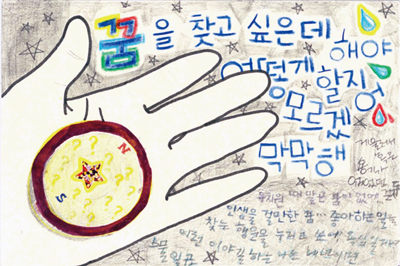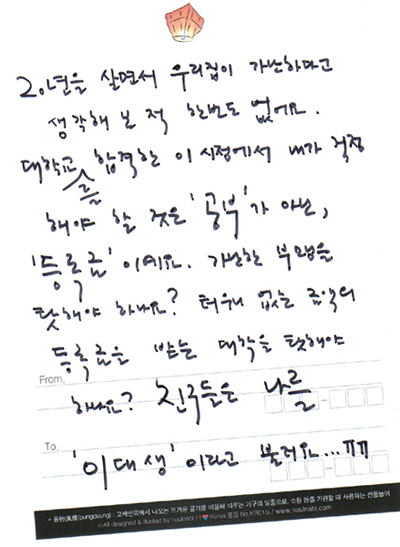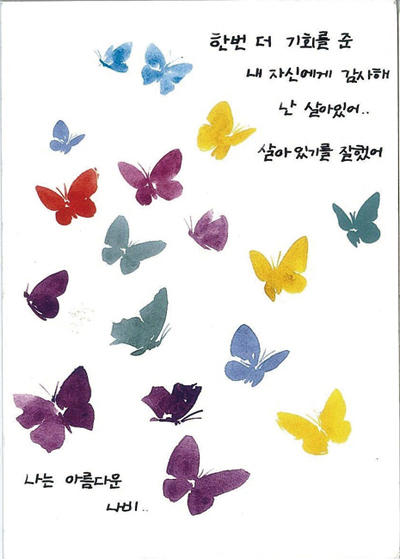
This was how Post Secret, a communal art project Warren created, began.
The National Institute of Mental Health of the United States granted a Special Award to this project, considering its devotion to preventing suicides.
In July 2011, Post Secret landed in Korea, under the name of Post Secret Korea via Korea University Supporting and Planning Agency (KUSPA). KUSPA is not a part of Post Secret, nor did it create Post Secret Korea. Rather, it received the official license from Post Secret. Therefore, KUSPA manages the mailbox where postcards arrive, scans the images, and uploads them on the official blog of Post Secret Korea (http://www.postsecret-korea.blogspot.com) as Warren does on his blog.

KUSPA distributed 2,000 postcards around the area where many university students are like Anam, Hongdae and cafes at Garosu-gil. From July 2011 to February 2012, more than 1,000 postcards have been received.
“Post Secret Korea has the purpose of sharing people’s secrets and sorrow which cannot be revealed but surely need to be consoled,” said Bae Kang-ha (Korea University, 3), the person in charge of Post Secret Korea at KUSPA.
A considerable number of the postcards that were sent to Post Secret Korea came from university students, and many of them were about homosexuality, sex life and financial burdens associated with paying high tuition. The writers of the postcards are all kept anonymous and commenting is banned just in case it hurts the writers’ feelings.

According to a psychology research, the mere action of expressing one’s inner story without expecting a specified reaction can be effective in helping one feel better.
“Despite not receiving feedback on their matters at all, people feel better from the action itself,” professor Ahn Hyun-nie (Psychology) said. “In the course of showing their emotion and thoughts, people objectify their situation, revalue it and finally gain control of themselves again.”
Students who enjoy visiting the Post Secret Korea blog also find the traditional way of writing postcards very interesting in this digital world.
“I think writing postcards is much more effective in conveying one’s idea than doing so in a digital form in appealing to the audience. Postcards make people listen to one’s story more intensely,” Yang Hyun-joon (Seoul National University, 2) said.
As Warren has done, KUSPA has shared numerous secrets in a variety of ways like holding an exhibition and a music concert with postcards, and preparing to publish a book for Post Secret Korea.
A place like Post Secret Korea where people disclose their deepest stories is expected to help relieve the harshness of people’s life.
“Considering its feature, opening secrets to the public in anonymity, Post Secret Korea has an effect in making different people communicate and feeling sympathy, consolation throughout society,” said Ju Young-a, the head of the counselors at the Ewha Student Counseling Center.
If you need a place to reveal your secrets that you have never told before due to some fear, send a postcard to the official blog of Post Secret Korea or send an e-mail (postsecret.korea@gmail.com).
Jang Youn-hee
janet9106@ewhain.net

